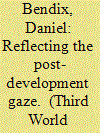| Srl | Item |
| 1 |
ID:
087586


|
|
|
|
|
| Publication |
2009.
|
| Summary/Abstract |
Since its emergence in the nineteenth
century, public health has primarily
been the charge of nation-states acting
to maintain the health of populations.1
In addition to taking steps to prevent
disease, governments deploy the rhetoric
of health and "hygiene" to police the
behavior and movements of immigrants
and colonial subjects.2 Yet the mobility
of microbes that circulate "through air
travel, commerce, and the circuits of
capital"3 has given rise to transnational
institutions such as the U.S. Centers for
Disease Control and the World Health
Organization, which track disease vulnerability
worldwide and pursue improvement
in the health of world populations.
|
|
|
|
|
|
|
|
|
|
|
|
|
|
|
|
| 2 |
ID:
176232


|
|
|
|
|
| Summary/Abstract |
The dominant international discourse about ‘fragile states’ calls for external actors to build the capacity of domestic institutions as a means of overcoming poverty and insecurity in the global South. It frames the pathway to greater peace and prosperity as primarily, if not entirely, domestically constituted, thereby confining the causes of poverty and insecurity to the domestic arena as well. This article argues that by focusing so intently on the domestic capacity of these states, international peace/state-building and development interventions discount, and thereby reinforce, non-domestic factors that impede security and development. These include: external support for repressive regimes; the sale of weapons to local actors; and the preservation of international trade arrangements implicated in sustaining global inequalities. This article argues that while each of these issues have greater levers for change in the North than in the South, they are generally excluded from discourses about overcoming poverty and insecurity. Therefore, if international actors are serious about attending to these issues, there are more pressing areas for reform than the internal institutional configurations of Southern states. Intervening in domestic institutions is, however, what development and state-building agencies are structured to do, meaning that to overhaul this mandate would directly challenge their existence.
|
|
|
|
|
|
|
|
|
|
|
|
|
|
|
|
| 3 |
ID:
156648


|
|
|
|
|
| Summary/Abstract |
Post-Development has reproduced the ‘development gaze’ by focusing on interventions and struggles in the South. This paper draws attention to the German version of degrowth, Postwachstum, as a possible Post-Development approach in the North. It thus contributes to the Post-Development agenda by including the North as a ‘development’ problem and by overcoming the view of the North as a homogeneous neo-liberal, capitalist, Eurocentric bloc. The paper examines key Postwachstum contributions with regard to their correspondence to insights of and gaps in the Post-Development debate. It argues that Postwachstum needs to include a postcolonial perspective on global inequalities and question the ‘development’–modernity–coloniality nexus more profoundly in order to provide a valuable contribution to the Post-Development agenda.
|
|
|
|
|
|
|
|
|
|
|
|
|
|
|
|